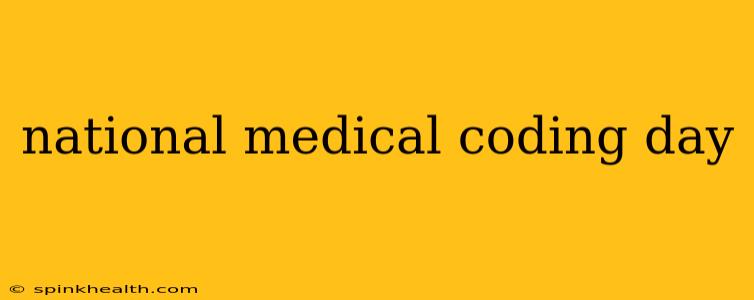Every year on October 26th, we celebrate National Medical Coding Day – a day dedicated to the unsung heroes of the healthcare system: medical coders. These meticulous professionals are the bridge between patient care and accurate billing, ensuring hospitals, clinics, and other healthcare providers can function smoothly. But what exactly is medical coding, and why is it so crucial? Let's delve into this fascinating field and celebrate its importance.
My name is Sarah Miller, and I've spent over fifteen years working in medical billing and coding. I've seen firsthand the dedication and precision required for this critical role. This isn't just about numbers; it's about ensuring patients receive the care they need and providers get fairly compensated for their services.
What is Medical Coding?
Imagine a complex medical record, filled with doctor's notes, test results, and treatment plans. Medical coding is the process of transforming this information into standardized numerical and alphanumeric codes. These codes, based on systems like ICD (International Classification of Diseases) and CPT (Current Procedural Terminology), represent specific diagnoses, procedures, and medical services. Think of it as a universal language that allows healthcare providers to communicate efficiently with insurance companies and government agencies. Without accurate coding, the entire healthcare billing process would grind to a halt.
Why is Accurate Medical Coding Important?
Accurate medical coding is the bedrock of efficient healthcare finance. It impacts everything from:
- Patient Care: Correct coding ensures patients receive the appropriate level of care and treatment, based on their diagnoses and needs.
- Reimbursement: Accurate codes guarantee healthcare providers are fairly compensated for the services they provide, ensuring financial stability and the ability to continue providing quality care.
- Data Analysis: Coded data forms the basis for public health research, allowing healthcare professionals and researchers to identify trends and improve healthcare systems.
- Fraud Prevention: Accurate coding helps prevent fraudulent billing practices, protecting both patients and healthcare providers.
What are the Different Types of Medical Codes?
There are several key coding systems used in healthcare:
- ICD Codes (International Classification of Diseases): These codes describe diagnoses, illnesses, injuries, and other health conditions. The latest version, ICD-10-CM, is incredibly detailed, allowing for precise classification of a vast range of medical conditions.
- CPT Codes (Current Procedural Terminology): These codes represent medical, surgical, and diagnostic procedures. CPT codes provide specific detail about the services rendered, ensuring accurate billing.
- HCPCS Codes (Healthcare Common Procedure Coding System): These codes are used for procedures, supplies, and services not found in CPT.
What Skills Do Medical Coders Need?
Medical coders need a unique blend of skills to succeed:
- Attention to Detail: Accuracy is paramount, as even a small error can have significant financial and healthcare consequences.
- Medical Terminology Knowledge: Understanding medical jargon is essential for correctly interpreting medical records.
- Analytical Skills: Coders must analyze medical records to identify the appropriate codes, often dealing with incomplete or ambiguous information.
- Computer Skills: Medical coders work extensively with computer systems and specialized coding software.
- Knowledge of Reimbursement Policies: Understanding insurance regulations and reimbursement policies is crucial for accurate billing.
How Can I Become a Medical Coder?
Many avenues exist to become a successful medical coder:
- Formal Education: Associate's or bachelor's degrees in health information management are beneficial, offering comprehensive training.
- Certification: Obtaining certifications from organizations like the AHIMA (American Health Information Management Association) demonstrates competency and enhances job prospects.
- On-the-Job Training: Many healthcare facilities offer on-the-job training, providing practical experience.
What is the Future of Medical Coding?
With the ever-evolving landscape of healthcare, the future of medical coding is bright. The increasing complexity of medical treatments and technology necessitates highly skilled professionals who can accurately translate these advancements into standardized codes. The continued development of electronic health records (EHRs) will also influence how medical coding is performed, requiring adaptation and ongoing professional development.
National Medical Coding Day is more than just a date on the calendar; it's a recognition of the critical role medical coders play in maintaining the integrity and efficiency of our healthcare system. It’s a day to celebrate the precision, dedication, and hard work of these essential professionals. So, let's take this opportunity to thank the medical coders who work tirelessly behind the scenes to keep our healthcare system running smoothly.

